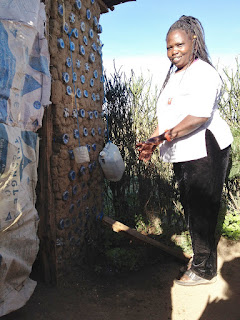Among the elements that bind us together is a strong desire to support women in need. Women helping women. My work as a Fulbrighter has frequently brought exposure to numerous situations in which my immediate thought was "How can I help?" Or, more importantly, "How can I NOT help?"
During a recent visit to Kenya, I visited Mwariki, a small and somewhat remote village where I met a woman, Eileen Waithera, who served as my guide and translated when necessary. Since 2007, due to tribal warfare and economic strife, the majority of the Mwariki's men either died or did not return to their homes and families. As a result, the women did (do) not have a steady source of income to purchase even the basic necessities of clothes, food, and shelter for their children.
Recently, Eileen worked with the women to create sustainable projects that would support the purchase of food and shelter, and quality education for their children. A co-op was formed to serve the community as a whole. Funds are pooled to send the brightest children to university so they will return and share their knowledge to the benefit of Mwariki.
Some of their immediate goals and projects:
1. Fish farming: experts were brought to the village to teach the women how to create a hatchery in the village. The "hatchery" is a large hole in the ground, which the women aerate daily. Each year, over 3000 fish are supplied to area restaurants.
2. Construction of a "house" for HIV positive children: HIV is an epidemic in Kenya, and support services are essentially non existent. I saw the house the women have built for the children. Small and very, very basic. But it will provide shelter and love for the patients upon completion.
3. Funds are pooled to purchase land: the women currently rent land and houses. They are working together to own the land and houses.
4. Clean water harvesting: the local water has dangerously high levels of fluoride that leads to flourosis skeletal and non skeletal disease. They are trying to purchase water tanks to hold clean water.
5. Loans of 1%: the women are working collectively to raise enough funds to offer loans that carry a 1% interest rate towards small business practices.
6. Purchase of sheep: they need sheep! Why? Because most of the women are knitters, and sell their knitted projects to support the collective.
This hut is made from recycled water bottles. It provides clean water for hand washing. Water pours from the jug when pressure is placed upon the wooden plank. The women in the photo is Eileen.
Some of the knitted products created by the women.
All wool is spun by hand.
This little girl followed me everywhere, but I
could not get her to smile. Haunting.
After completing the tour and making a few observations, I spoke with Eileen regarding an idea that began to formulate. I noticed the women's knitted products were rudimentary and involved simple patterns using only two or three stitches. The women could clearly knit, but lacked the knowledge base to create and design more advanced----and thus more marketable----work. Would the women welcome the idea of learning new stitches and techniques? With an overwhelming, enthusiastic "Yes!" from Eileen, I was on my way to linking the Indigenous Village in the States with Mwariki
village in Kenya.
After making contact with the village in the US, members devised the idea to create a fundraiser:
On Wednesday, November 14th in the Gamut Theatre located in Harrisburg, PA, the all-female improv comedy troupe No Artificial Sweeteners is hosting a special performance to serve as a benefit for the women of Mwariki. Audience members are asked to bring knitting books (paperbacks are best), yarn, or money toward the purchase of these items, which will be shipped to Kenya in time for the holidays.
Perhaps it is now clearer why I'm blessed to be part of an Indigenous Village in my own country.
|
|







